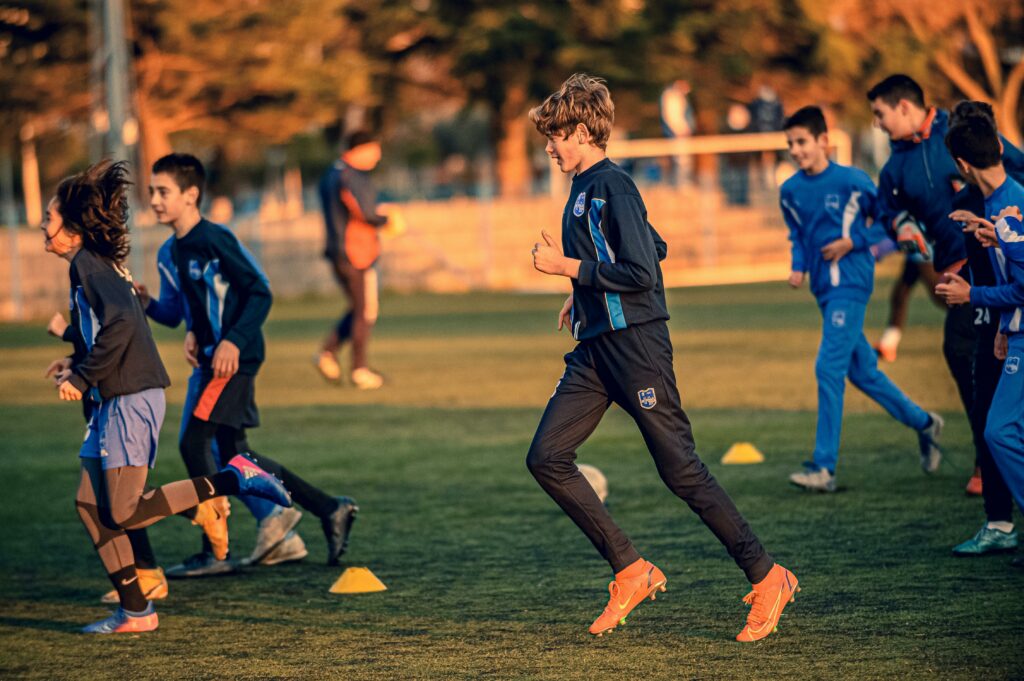The debate over teens and smartphones has become a modern parenting challenge. Many parents feel tempted to ban the device altogether, yet prohibition rarely works long-term. Instead, we must ask a better question:
How can we shape a child’s life so the phone becomes a tool, not a trap?
The answer lies in a powerful and positive alternative — the world of sport.
This article explores how athletic participation meets teenagers’ psychological needs and naturally reduces their dependence on screens.
Understanding the teenage brain’s needs
Adolescence is a time of intense growth — mentally, emotionally, and socially. Teenagers are naturally seeking three key things:
- A strong sense of identity
- A genuine community
- Reward and motivation through dopamine-driven experiences
Smartphones and social media are cleverly designed to meet these needs. They provide instant dopamine hits through notifications, offer a curated online community, and create a platform for self-expression.
When a teen is constantly glued to their phone, it’s often a symptom of unmet developmental needs, not simply a lack of discipline.
The data behind screen time and well-being
Research paints a clear picture.
A study published in The Lancet found that high daily screen time is strongly linked to lower psychological well-being among young people.
Conversely, the Journal of Adolescent Health reported that physically active teens experience lower levels of anxiety and depression.
This contrast highlights the opportunity: if excessive screen time can harm mental health, physical activity can help restore it.
How sport builds a natural defense system?
1. Sport teaches emotional regulation
On the field, emotions run high. Athletes learn to cope with frustration after a missed goal, focus under pressure, and celebrate progress. These lessons build resilience and emotional control — skills that translate directly to resisting the urge for constant digital stimulation.
2. Sport creates genuine community
Team sports foster deep bonds through shared goals, practice, and challenges. Locker-room talks and team huddles create a real sense of belonging.
This authentic connection reduces the need for fleeting social media validation.
3. Sport instills healthy habits
Performance requires proper nutrition, quality sleep, and mindful recovery. Athletes learn that taking care of their bodies fuels their success, lessons that extend far beyond the game.
These self-care routines form a holistic defense against stress, anxiety, and unhealthy screen habits.
4. Sport reframes the purpose of technology
Interestingly, young athletes often shift how they use their phones. Instead of mindless scrolling, their devices become tools for progress — training tutorials, performance tracking, and team coordination.
This transition from passive consumption to purposeful use is a critical milestone in digital maturity.
Empowerment over prohibition
The ultimate goal isn’t to eliminate smartphones. It’s to raise children whose lives are rich, balanced, and engaging.
Sport provides that richness. It nurtures discipline, teamwork, and self-awareness while giving teens the satisfaction of real-world achievement. It’s to understand that sport as an ally against smartphone addiction is powerful!
Rather than fighting screens, we should fill life with meaning beyond them and support them.
Your role as a parent or coach
Parents and coaches play a crucial role in this transformation.
Encourage participation in sports and celebrate effort over outcome. Discuss how technology can enhance and not replace their real-world passions.
Highlight the connection between performance, nutrition, rest, and mindset.
When young people understand how their habits affect their goals, they develop internal motivation to manage screen time wisely.
In conclusion: raising resilient, connected teens
We are not battling against screens, it’s the opposite: we are championing a healthier, more connected generation.
Through sport, we offer teens a way to build identity, community, and confidence in the real world.
By making sport an ally against smartphone addiction, we give them the tools to thrive both online and offline.
📚 Resources & further readings
- The Lancet Study: Associations between screen time and lower psychological well-being among children and adolescents.
- Project Play by the Aspen Institute: Frameworks on youth sports development – aspenprojectplay.org
- Common Sense Media: Guides on screen time and digital citizenship – commonsensemedia.org

